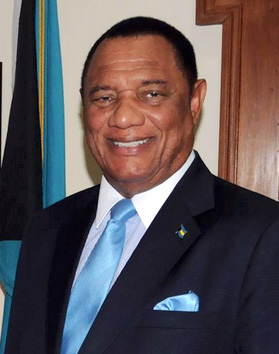
Remarks by The Rt. Hon. Perry G. Christie, M.P.
Prime Minister & Minister of Finance for The Commonwealth Of The Bahamas
at The Caribbean Investment Summit London, England
10th September, 2015
Ladies and gentlemen,
I am indeed pleased to be given an opportunity by the Caribbean Export Development Agency (CEDA) and the Caribbean Association of Investment Promotion Agencies (CAIPA) to address the 2015 Caribbean Investment Summit.
I am equally pleased to be in the beautiful city of London, which continues to hold sway as a city of both the past and the future, constantly evolving and continuing to attract ultra-high net worth investors.
In fact, last year’s Wealth Report reported that London had more ultra-high net worth individuals than any other city in the world in 2013, and will continue to maintain its pre-eminence for the next decade.
In today’s challenging economic climate, such investors, natural and corporate, are sought after more than ever as, by virtue of their investments, they continue to generate valuable and sought after economic benefits for host countries around the world.
Foreign investment in the Caribbean, Central and Latin America has been more diversified in recent years. In Central and Latin America, re-investment in projects have been sustained at high levels, fueling double-digit growth and early recoveries of those economies.
Comparatively, the more vulnerable economies of the Caribbean continue to experience slower but steady growth, exhibiting in some countries greater reliance on inflows of remittances from the diaspora than on foreign investment to spur economic growth.
There is, however, good news on the horizon with respect to the state of affairs of Caribbean economies. This year, there has been more resilience seen in those economies in the region with rebounding
tourism which has been supported by a rejuvenated US economy, lowered fuel prices and an improved investment climate.
The climate is indeed ripe for inward investment in the Caribbean which has re-doubled its efforts toward implementing energy and fiscal reforms, promotion of investment incentives, strengthening of compliance frameworks and continued redress of social ills in the wake of the global economic crisis.
The Caribbean region as a whole provides competitive advantages of accessibility, economic and political stability, adequate labour supply, modern infrastructure, robust investment incentive frameworks and trade facilitation, with some preferential access to markets through its trade agreements with Europe, the United States and Canada.
Consequently, there are many opportunities for inward investment, and promotional efforts in this direction are yielding good results. In fact, foreign investors are now venturing in previously unexplored sectors of our economies: in natural resources, infrastructure, manufacturing, real estate, transport, telecommunications, energy, stem cell research and medical tourism, and as we continue towards development of a single market, such peripheral vision will ultimately reap real rewards over the long-term.
A substantial amount of foreign direct investment must continue to build on the traditional sectors where the Caribbean has a competitive advantage, which include tourism, financial services, business service outsourcing, fisheries and agro-processing.
We recognize however, that with 60% of our population under the age of 30 and a propensity among our youth for the pursuit of excellence in sports, art, music and cultural endeavours, we must find ways to invest more in the creative industries that can feed into our main economic pillars and develop sustainable linkages across sectors of our economy.
Tourism has been the primary economic driver, but has not matured equitably in our region. This is attributed to the lack of access to SME financing for development of the needed critical mass of investments in retail business, services, technology and research to develop development frameworks, boost consumer demand, and deliver better returns to investors and revenues to Caribbean governments.
I certainly remain convinced, however, that the tourism sector and its niche industries will continue to be the engine of economic growth, employment, human capital development, industry diversification and business improvement for most of the 40 million citizens of the Caribbean.
Most countries of the region are relatively small, but each one is unique, presenting plethora of natural and pristine landscapes, with a distinct set of social and cultural experiences to global travelers; therefore, investment, particularly in Caribbean tourism, cannot be a one size fits all proposition.
This is not only true of Caribbean countries, but also individual countries like The Bahamas, where each of the 30 inhabited islands in the chain of seven hundred islands, is ecologically and economically different, one from the other.
There are also distinctly different strengths and weaknesses inherent in each country’s overall economic model and more research is needed to distinguish individual country attributes and levels of competitiveness to enable Caribbean countries to do a better job of investment promotion to foreign investors and Caribbean investors of the diaspora as well as those within the wider Caribbean community.
Additionally, the region has awakened to the power and potential of its people, particularly in areas such as art, culture and sports, all of which can be seen as drivers of tourism.
Emphasis should be placed on identifying the specific formula of domestic inputs which are peculiar to each of our countries, as well as each government’s propensity to capitalize on opportunities external to these efforts, to improve tourism’s viability and success and revitalize and spur economic growth.
Many Caribbean countries are experiencing sustained increases in international tourism arrivals. The World Tourism Organization reports that in the first 11 months of 2014 travel to the region increased by seven percent, outpacing the international industry average of four percent, with even stronger growth projected in 2015.
Despite these gains, the relatively flat levels of GDP seen throughout the region can be attributed to the continued servicing by many Caribbean countries of high levels of national debt. This means that, for these countries, in the medium term, the engine for growth must continue to be sourced from external, private sector sources.
That is not to say that foreign investment alone will improve our fortunes, but I believe it will require a dedicated and ongoing process of private sector-led investment to build capacity and enterprise aimed at strengthening our domestic economies and creating a state of employment readiness across all sectors.
It will also require substantial investment as public-private partnerships in infrastructure development and transportation to stimulate cross-border trade between countries.
What continues to hamper efforts is the ongoing challenge of local capital formation and entrepreneurship, interrupted business growth, human capital development and skills transfer and inherent weaknesses in regulatory performance, all of which present constraints to employment and economic mobilization for many countries of the Caribbean.
The tourism supply chain continually relies on quality construction, management and maintenance of resort and residential resort investments, which are enhanced by cost effective provisioning of locally made goods such as furniture and fixtures, food production, electronics, bedding, art work, accessories and other products.
Equally critical to its resilience, are a diverse array of retail services such as hospitality, food & beverage, laundry, landscaping, maintenance, technology, marketing, air-conditioning & refrigeration, licensing, legal, insurance, utilities, education and training, transportation and entertainment as well as many products and services which deliver indirect economic impacts on the domestic economy.
Additionally, our governments continue to experience high levels of revenue leakage from the absence of domestic linkages in the tourism value chain, as well as repatriation by investors of high percentages of profits, even as we continue to create enabling environments for investors that prioritize investment incentives and promotion, standards improvement and trade facilitation for long-term business sustainability.
Some proponents of the Caribbean Single Market argue that the Caribbean must become a single market to capitalize on inflowing currents of investment. In other words, our individual markets are perceived as too small to deliver sufficient returns on capital and thus to attract significant amounts of foreign direct investment.
While I am in agreement that more needs to be done to develop linkages in trade to achieve liberalization, and ultimately, global economic integration, we must firstly recognize the overarching need to ensure that all nations within our sphere of influence are on a path to macro-economic stability.
The International Monetary Fund has applauded the region’s efforts on debt restructuring and management in this regard and is now working more pragmatically with our small nation states to better align debt stabilization initiatives with social agendas to ensure that the most vulnerable in our societies are protected.
Secondly, we must give attention to ensuring that our countries achieve an acceptable level of energy security. Coming out of the Caribbean Energy Security Initiative held last January – which was attended by the Prime Ministers and Ministers of Energy of eighteen Caribbean countries and presided over by the U.S. Vice President, Mr. Joe Biden – was the establishment of the Caribbean Energy Investment Network (CEIN) and support for concessional development financing for the Region in the areas of energy, climate change and disaster management.
This is a welcome shift in U.S. policy and we are optimistic that the Network launched will induce partnerships between our small states and international energy suppliers and attract investment in energy security and efficiency as well as the integration of renewables within our national borders.
Equally essential to the success of these efforts is the technical support pledged by the multilateral institutions, the International Monetary Fund, the World Bank and Inter-American Development Bank, to facilitate to these initiatives. We are hopeful that the G8 and G20 countries will take note of these developments, particularly in light of the economic fragility
of small island developing states.
Thirdly, we must accelerate our national development strategies, investing particularly in the area of human resources, and provide more opportunities for training among the ranks of private enterprise and public agencies to strengthen human capital and enable greater mobility of talent.
Fourthly, we must invest in the use of technology to modernize and improve our regulatory regimes and induce more innovation and creativity in joint ventures particularly among SME’s, and public private partnerships to shape long-term development. This will improve the cost, quality and availability of products and services which facilitate investments in tourism, agriculture, manufacturing, business processing and financial services and stimulate more cross-border trade.
While I remain convinced of its value and ability to provide decent and diverse livelihoods for the people of the Caribbean, I recognize the deficiencies in our collective tourism eco-systems that continue to undermine regional efforts.
We must undertake public/private partnerships for investment in infrastructure and transportation to improve land and sea access to markets within the region and beyond.
On the regional front, the investment opportunities are endless, but we will need to engage more collaboratively with investors as well as our region’s governments to find new ways to facilitate investment in business start-ups, lowered cost of procurement and information-sharing via communications technology such that the rising tide of value-added in the tourism industry lifts all boats across the region.
Although most of the countries of the Caribbean are moving toward regional integration, it is difficult to manage sustained focus on a Caribbean Single Market when our economies continue to be weakened by global economic after-shocks and the punitive actions of international regulatory agencies such as the OECD aimed specifically at what the EU has called “non-cooperative tax jurisdictions” in the Caribbean in spite of our compliance with international regulatory requirements.
What the OECD countries have failed to comprehend is that the playing field is not levelled. Caribbean economies are barely emergent economies which have succeeded, albeit with much struggle, in establishing governance and compliance frameworks which meet the demands of these agencies without the benefit of centuries of development and economic self-determination and without any significant investment inflows from their jurisdictions.
Lastly, I would suggest that investors examine more carefully the range of opportunities which abound in the Caribbean, some of which I have just articulated and which may be on a smaller scale than the larger capital projects, or more cross-cutting across service industries, but ultimately offer long term benefits while delivering healthy returns on investment.
Nineteen Caribbean countries are members of the Caribbean Association of Investment Promotion Agencies, or CAIPA, which was established to help investors identify projects throughout the Caribbean in a state of readiness for investment and facilitate interactions with Caribbean governments who are certainly willing to sit, discuss and review public policies which may be inhibiting interest or action on the part of foreign investors.
All potential Caribbean investors should be encouraged by the region’s posture toward inward investment, and particularly public private partnership, which can only be ably demonstrated through dialogue and good will.
I wish to thank the Caribbean Export Development Agency (CEDA) which has partnered with CAIPA and engaged Caribbean governments in identifying their unique investment and development needs. CEDA has worked in collaboration with investment promotion intermediaries such as CAIPA, to build capacity in country branding and promotion, advance regional cooperation and promote inward investment.
The fact that five Caribbean countries were identified in 2011 as being among the top Caribbean and Central American countries of the future by Britain’s FDI Intelligence Division demonstrates the continued importance of the work of CEDA and underscores the tremendous potential of Caribbean countries to realize human capital development, economic growth for its citizens and profits for its investors and stakeholders.
I thank all of you for your interest in The Caribbean and hope to see some of you visiting our shores in the near future to pursue mutually rewarding investment opportunities.
Thank you.







